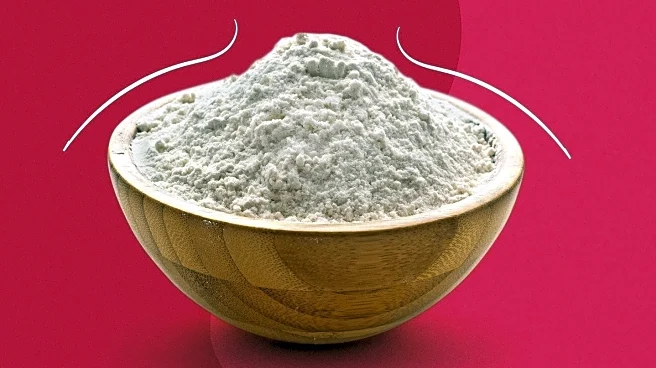What's Happening?
Recent findings suggest that increasing dietary protein intake can significantly improve hair thickness and reduce shedding. This development is supported by dermatologists and nutritionists who emphasize the role of protein in hair health. Hair is primarily composed of keratin, a protein, and adequate protein consumption ensures the body has enough amino acids to support keratin production. This process is crucial during the anagen phase of hair growth, preventing premature shedding. Experts highlight that protein malnutrition can lead to telogen effluvium, a condition characterized by sudden hair shedding. Increasing protein intake provides the necessary raw materials for hair follicles to produce healthier strands. While hair growth vitamins and supplements may not address underlying dietary deficiencies, focusing on protein intake can have a tangible impact on hair health.
Why It's Important?
The significance of this finding lies in its potential to offer a natural and effective solution for individuals experiencing hair thinning and shedding. By addressing protein deficiencies, people can improve their hair health without relying on supplements that may not target the root cause. This approach also underscores the importance of a balanced diet in overall health, as hair health often reflects one's nutritional status. For those with low protein intake, increasing consumption can lead to stronger, healthier hair, while also supporting muscle function and recovery. This dietary adjustment can be particularly beneficial for athletes and active individuals who require higher protein levels.
What's Next?
Individuals interested in improving their hair health through diet should consider calculating their protein intake based on personal factors such as age, weight, and activity level. Experts recommend a daily protein intake of 0.8 grams per kilogram of body weight for sedentary adults, with higher amounts for active individuals. Incorporating protein-rich foods like eggs, fish, chicken, and legumes into meals can help meet these targets. Additionally, convenience products like protein shakes can supplement dietary intake when necessary. Monitoring symptoms of protein deficiency, such as brittle hair and nails, can guide adjustments in diet. Consulting with healthcare professionals may be advisable for sudden or severe hair loss.
Beyond the Headlines
This development highlights the broader implications of dietary choices on health and wellness. It suggests that simple lifestyle changes can have significant impacts on physical appearance and well-being. The focus on protein intake also raises awareness about the importance of addressing nutritional gaps to prevent health issues. Furthermore, it encourages individuals to consider holistic approaches to health, integrating diet, exercise, and stress management for optimal results.









